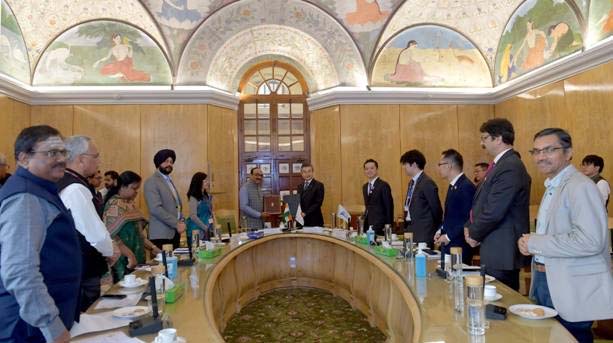“JPY 232 Billion Injection: Japan’s ODA Elevates India’s Project Portfolio”
<p>In the city of Kolkata, Japan has pledged an Official Development Assistance (ODA) loan amounting to Japanese Yen 232.209 billion. This financial commitment encompasses nine diverse projects, spanning across regions such as North East, Telangana, Chennai, Haryana, and Uttarakhand. The areas of focus include road connectivity, the promotion of start-ups and innovation, sustainable horticulture, and […]</p>

“JPY 232 Billion Injection: Japan’s ODA Elevates India’s Project Portfolio”
In the city of Kolkata, Japan has pledged an Official Development Assistance (ODA) loan amounting to Japanese Yen 232.209 billion. This financial commitment encompasses nine diverse projects, spanning across regions such as North East, Telangana, Chennai, Haryana, and Uttarakhand. The areas of focus include road connectivity, the promotion of start-ups and innovation, sustainable horticulture, and more. The formal exchange of official notes transpired on a Tuesday, involving Vikas Sheel, Additional Secretary of the Department of Economic Affairs in the Ministry of Finance, and Suzuki Hiroshi, the Ambassador of Japan to India in New Delhi.
As per the orchestrated plan, a substantial portion of the ODA, totaling 34.54 billion Japanese yen, has been designated for the North East Road Network Connectivity Improvement Project (Phase 3), specifically for the Dhubri-Phulbari bridge. Additionally, an allocation of 15.56 billion Japanese yen is earmarked for the North East Road Network Connectivity Improvement Project (Phase 7), focusing on the Phulbari-Goeragre section.
The remaining projects encompass various initiatives, including the promotion of start-ups and innovation in Telangana (JPY 23.7 billion), the construction of Chennai Peripheral Ring Road (Phase 2) (JPY 49.85 billion), the promotion of sustainable horticulture in Haryana (Tranche I) (JPY 16.21 billion), a climate change response and ecosystem services enhancement project in Rajasthan (JPY 26.13 billion), the establishment of the Medical College Hospital at Nagaland Institute of Medical Sciences and Research, Kohima (JPY 10 billion), an urban water supply system improvement project in Uttarakhand (JPY 16.21 billion), and the dedicated freight corridor Project (Phase 1) (Tranche V) (JPY 40 billion).
The road network connectivity projects aspire to augment infrastructure development in the North East region of India. Simultaneously, the Chennai peripheral ring road undertaking aims to mitigate traffic congestion and fortify connections to the southern part of the state.
The Nagaland project is poised to elevate tertiary-level medical service delivery by establishing a Medical College Hospital, contributing significantly to universal health coverage. Telangana’s distinctive initiative seeks to unearth entrepreneurial skills, with a particular focus on women and the rural population, fostering the expansion of MSMEs.
In Haryana, the endeavor is geared towards fostering sustainable horticulture, augmenting farmers’ income through crop diversification and infrastructure development. The forestry project in Rajasthan endeavors to enhance ecosystem services via afforestation, forest, and biodiversity conservation. Meanwhile, in the mountainous terrain of Uttarakhand, the project aims to secure a reliable water supply for urban towns. The fifth tranche of the dedicated freight corridor project aims to construct a new dedicated freight railway system, modernizing the intermodal logistics system to accommodate increased freight traffic.
The longstanding and fruitful history of bilateral development cooperation between India and Japan, dating back to 1958, is underscored by today’s exchange of official notes for these significant projects. The economic partnership, a pivotal aspect of India-Japan relations, has steadily advanced in recent years, reinforcing the strategic and global partnership between the two nations.








